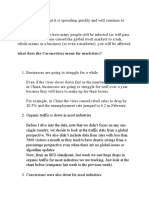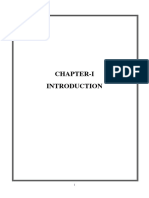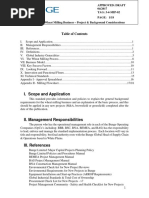Name Netid Group Number: Website Link: Tutorial Details Time Spent On Assignment
Name Netid Group Number: Website Link: Tutorial Details Time Spent On Assignment
Uploaded by
vaballe82Copyright:
Available Formats
Name Netid Group Number: Website Link: Tutorial Details Time Spent On Assignment
Name Netid Group Number: Website Link: Tutorial Details Time Spent On Assignment
Uploaded by
vaballe82Original Description:
Original Title
Copyright
Available Formats
Share this document
Did you find this document useful?
Is this content inappropriate?
Copyright:
Available Formats
Name Netid Group Number: Website Link: Tutorial Details Time Spent On Assignment
Name Netid Group Number: Website Link: Tutorial Details Time Spent On Assignment
Uploaded by
vaballe82Copyright:
Available Formats
1
INFOSYS.110 BUSINESS SYSTEMS: DELIVERABLE 2: BUSINESS SECTION SUMMER 2014 Name NetID Group Number: Website Link: Tutorial Details Time Spent on Assignment: Vincent Aballe vaba390 25 http://infosys110group25.blogspot.co.nz/ Tutor: Day: Tuesday and Yvonne Hong Friday 25 hours
Time: 10am
Word Count: 951
PUSH BUTTON CHARITY
INTRODUCTION
In the age of online shopping, Twitter and smartphones, donating to charity has become far too outdated and inconvenient and charities are suffering because if it. Even renowned charitable organizations such as St John Ambulances are currently running at $15 million losses (Savage, 2012). This is where Push Button Charity comes in. It emerges in a reletively unscathed market for online donations and brings aspects of fun and ultimate convenience.
3. BUSINESS SECTION 3.1 Vision
To give everyone the power and the convenience to donate to the causes they care about, empowering the notion of giving making the world a better place.
3.2 Industry Analysis: Charitable App Industry
Industry: Charitable app Industry. This industry is relatively new and untapped. It is contained within the realm of smartphone apps.
Force:
High/Low:
Justification:
Buyer power:
High
The industry provides a wide range of charitable apps to choose from which can be obtained from a virtual store. (Duncan, 2013)
Supplier power:
High
There are only three major suppliers of a marketplace for apps for two major smartphone software providers which is Apple, Android and Windows. (Bradley, 2013)
Threat of new entrants:
High
There are many charitible apps in the market and new apps are always arriving. (Duncan, 2013)
Threat of substitutes:
High
There are multiple more established forms of donating. For example with St John you can donate via their webpage. (How you can help, 2014).
Rivalry among existing High competitors:
There
are
many
charitible
apps
in
the
marketplace competing with each other some with varying reliability. (Author, 2013).
Overall attractiveness of the industry: With all five forces being high it would imply the it would not be an attractive industry to enter however the barrier for entry is so low, with relatively low costs to input a product can easily be established.
3.3 Customers and Their Needs
Our customers is anyone with a smartphone who wants to donate to charity. A case study in, similar country, Australia found that three quarters of Australians had internet access. This is a huge proportion of the market population. However at the moment their needs are currently not being met. This need being that of wanting to donate to charity with as little of a hassle as possible. We are also in particular are targetting the younger generation, who are becoming more and more technologically savvy without any way of donating to charity that complements this. We also want to match the viral nature of new media with a similar population size. (BENEFITS OF MOBILE, 2014)
3.4 THE PRODUCT AND SERVICE
The product is Push Button Charity. With current donation cycles stagnating we want Push Button Charity to be the answer to injecting the industry with much needed viral spike. We
3
take the notion of donating and apply it to a single button and counter. It's simplicity and the removal of the middleman provides convenience and a side swipe to choose charities and a drop down menu to pick donation amounts provides ease. This services customers who are often to inconvenienced with other means of donations such as street people and telephone calls. These customers are often students who are coincidentally those most occupied with new media and "the latest app".
3.5 Suppliers and Partners
Some suppliers would include PayPal and other means of internet banking such as ANZ or KiwiBank. This way we would be able to secure channels in order for payment proccesses to go ahead. Another supplier would also be the likes of Apple and Android in order to secure positions in an app marketplace. Potential partners would be the likes of St John Ambulance and Red Cross which channels could be discussed for their promotion of our app to secure our validity and a reputable state while we hold them as, for example the default charity for donations to stream to.
3.6 Strategy: Red Leicester Chalk and Cheese
The competitive scope would be broad market as our app would reach practically everyone who is in posession of a smartphone and a bank account. The cost strategy would be low cost in order for there to be no barrier for people to donate. The overall strategy is therefore Cost leadership.
3.7 Value Chain Activity: Technological development (and R&D)
The most important value chain activity for this business is Technological development (and R&D). This is as to develop Push Button Charities donation processes to such a refined state that they are reliable and trustworthy. With this degree of trustworthiness we are able to be safely advertised with potential partner charity organisations and establish ourselves with prominence over other functioning charitable apps. Such technological develptopments
4
include online payment processing, graphical interfaces, notifcation systems, payment security, secure analytics and more.
CONCLUSION
In conclusion Push Button Charity is an app that can revitalise the way the mass population can donate. It is important that we tap into new technology to find new innovative ways to donate to charity as the status quo is not working. Information systems such as can truly add value to the way donations are done.
REFERENCES
1. Duncan, Geoff. (2013). Charity made mobile: How to give from your phone without getting scammed. Retrieved from http://www.digitaltrends.com/mobile/sixapps-use-smartphone-good-ways-avoid-scammed-year/ 2. Savage, Daniel. (2012). Cut to ambulance services. Retrieved from http://www.nzherald.co.nz/nz/news/article.cfm?c_id=1&objectid=10833423 3. Bradley, Tony. (2013). Android Dominates Market Share, But Apple Makes All The Money. Retrieved from http://www.forbes.com/sites/tonybradley/2013/11/15/android-dominatesmarket-share-but-apple-makes-all-the-money/ 4. How you can help. (2014). Retrieved from http://www.stjohn.org.nz/Supportus/How-I-Can-Help/
5.
BENEFITS OF MOBILE. (2014). Retrieved from http://www.apps4change.org.au/LearningCentre/WhyGoMobile.aspx
You might also like
- The Supply Chain of The IKEA CompanyDocument3 pagesThe Supply Chain of The IKEA CompanyAndrea Chiappe Restrepo100% (1)
- Social Media Marketing Impact On Delivery CompaniesDocument12 pagesSocial Media Marketing Impact On Delivery CompaniesSaima AsadNo ratings yet
- Social Media Marketing: A Comprehensive Guide to Growing Your Brand on Social MediaFrom EverandSocial Media Marketing: A Comprehensive Guide to Growing Your Brand on Social MediaNo ratings yet
- Starting Consulting Business GuideDocument17 pagesStarting Consulting Business GuidecjtboyNo ratings yet
- Case Study 6 Merton Healthcare TrustDocument2 pagesCase Study 6 Merton Healthcare TrustWylmer Ann Dionisio100% (1)
- TM603 L1 - Introduction To Strategic Planning UKDocument36 pagesTM603 L1 - Introduction To Strategic Planning UKMaleneeNo ratings yet
- Mckinsey Assessment GridDocument42 pagesMckinsey Assessment GridAssesaHDNo ratings yet
- TOGAF 9 Summary of Study GuideDocument23 pagesTOGAF 9 Summary of Study GuideJuan K Luna100% (1)
- INFOSYS110 2014 Deliverable 02 GwallaceDocument11 pagesINFOSYS110 2014 Deliverable 02 GwallacegggwallaceNo ratings yet
- Name Netid Group Number: Website Link: Tutorial Details Time Spent On AssignmentDocument11 pagesName Netid Group Number: Website Link: Tutorial Details Time Spent On Assignmentsfai826No ratings yet
- Name Netid Group Number: Website Link: Tutorial Details Time Spent On AssignmentDocument9 pagesName Netid Group Number: Website Link: Tutorial Details Time Spent On AssignmentSvas243No ratings yet
- Name Netid Group Number: Website Link: Tutorial Details Time Spent On AssignmentDocument11 pagesName Netid Group Number: Website Link: Tutorial Details Time Spent On Assignmentrsti010No ratings yet
- Name Netid Group Number: Website Link: Tutorial Details Time Spent On AssignmentDocument12 pagesName Netid Group Number: Website Link: Tutorial Details Time Spent On AssignmentNelz84No ratings yet
- Delieverable 2Document11 pagesDelieverable 2aoke643No ratings yet
- How Smart Technologies Are Transforming Life & Business Now!Document10 pagesHow Smart Technologies Are Transforming Life & Business Now!Clarence CardonaNo ratings yet
- Name Netid Group Number: Website Link: Tutorial Details Time Spent On AssignmentDocument11 pagesName Netid Group Number: Website Link: Tutorial Details Time Spent On AssignmentReagenLawrenceNo ratings yet
- Name Netid Group Number: Website Link: Tutorial Details Time Spent On AssignmentDocument11 pagesName Netid Group Number: Website Link: Tutorial Details Time Spent On AssignmentCherylTanNo ratings yet
- Assignment On Internet As A Marketing ToolDocument27 pagesAssignment On Internet As A Marketing ToolMohit GuptaNo ratings yet
- Name Netid Group Number: Website Link: Tutorial Details Time Spent On AssignmentDocument12 pagesName Netid Group Number: Website Link: Tutorial Details Time Spent On Assignmentb123clarkNo ratings yet
- Assignment 1Document4 pagesAssignment 1Leïla BakayokoNo ratings yet
- Metia Marketing Insights 2014Document30 pagesMetia Marketing Insights 2014Deborah Hanamura100% (3)
- Digital Marketing NotesDocument63 pagesDigital Marketing NotesRonove GamingNo ratings yet
- Chapter 2Document5 pagesChapter 2Karl JimenezNo ratings yet
- Crowdsourcing Applications: Chitvan Oza Ipsa Arora Prachi JainDocument13 pagesCrowdsourcing Applications: Chitvan Oza Ipsa Arora Prachi JainChitvan OzaNo ratings yet
- 2020 State of Digital Accessibility Report Level AccessDocument40 pages2020 State of Digital Accessibility Report Level AccessSangram SabatNo ratings yet
- Introduction AllignmentDocument65 pagesIntroduction AllignmentNikhil H UNo ratings yet
- India Goes DigitalDocument168 pagesIndia Goes Digitalgaurav_gupta_82No ratings yet
- Idea GenerationDocument12 pagesIdea GenerationChitvan OzaNo ratings yet
- Deliverable 2 Infosys 110Document12 pagesDeliverable 2 Infosys 110tfou747No ratings yet
- FB Q2'20 Earnings TranscriptDocument23 pagesFB Q2'20 Earnings TranscriptDGNo ratings yet
- Name Netid Group Number: Website Link: Tutorial Details Time Spent On AssignmentDocument10 pagesName Netid Group Number: Website Link: Tutorial Details Time Spent On Assignmentttur704No ratings yet
- Consumers, Context, and A Future For Communications PlanningDocument32 pagesConsumers, Context, and A Future For Communications PlanningjimcaigNo ratings yet
- Name Netid Group Number: Website Link: Tutorial Details Time Spent On AssignmentDocument11 pagesName Netid Group Number: Website Link: Tutorial Details Time Spent On Assignment503020086No ratings yet
- Anyomi BrightDocument8 pagesAnyomi BrightPapa KofiNo ratings yet
- Only Human A5 Download PDFDocument22 pagesOnly Human A5 Download PDFMILENANo ratings yet
- Effectiveness of Online AdvertisingDocument58 pagesEffectiveness of Online AdvertisingJohn Patrick Tolosa NavarroNo ratings yet
- Effectiveness of Online AdvertisingDocument58 pagesEffectiveness of Online AdvertisingJohn Patrick Tolosa NavarroNo ratings yet
- Global Digital FundraisingDocument29 pagesGlobal Digital FundraisingnfpsynergyNo ratings yet
- Name Ryan Dion Eastham Netid Group Number: Website Link: Tutorial Details Tutor: Day: Time: Time Spent On Assignment: Word Count: 1649Document10 pagesName Ryan Dion Eastham Netid Group Number: Website Link: Tutorial Details Tutor: Day: Time: Time Spent On Assignment: Word Count: 1649reas927No ratings yet
- Name Netid Group Number: Website Link: Tutorial Details Time Spent On AssignmentDocument11 pagesName Netid Group Number: Website Link: Tutorial Details Time Spent On Assignmentekau991No ratings yet
- Internet Advertising Thesis PDFDocument5 pagesInternet Advertising Thesis PDFjessicahillknoxville100% (2)
- Group2 ABM12B Chapters1-2-3 FINALDocument15 pagesGroup2 ABM12B Chapters1-2-3 FINALAna Marie InocencioNo ratings yet
- Digital Marketing NotesDocument50 pagesDigital Marketing Notesashiyasiddiqui195No ratings yet
- Noah Elkin Debra Aho Williamson David Hallerman: DECEMBER 16 2010 New York NyDocument50 pagesNoah Elkin Debra Aho Williamson David Hallerman: DECEMBER 16 2010 New York NyRichard KocherspergerNo ratings yet
- MM Case - Drop Technologies IncDocument9 pagesMM Case - Drop Technologies Incvaibhavd16No ratings yet
- P 0006 Internet Marketing Project ReportDocument65 pagesP 0006 Internet Marketing Project ReportSubrat DashNo ratings yet
- Name Netid Group Number: Website Link:: Timothy HowlettDocument10 pagesName Netid Group Number: Website Link:: Timothy HowlettTimhowlettNo ratings yet
- Why Location Is The New Currency of MarketingDocument9 pagesWhy Location Is The New Currency of MarketingGlenPalmerNo ratings yet
- Project - Market Research in Lead GenerationDocument31 pagesProject - Market Research in Lead GenerationChetan BommideniNo ratings yet
- IntroductionDocument10 pagesIntroduction404No ratings yet
- 10 Ideas For The New DecadeDocument16 pages10 Ideas For The New DecadelbeerNo ratings yet
- Task A: Topic BriefDocument2 pagesTask A: Topic BriefDR PrasadNo ratings yet
- Marketing-Research 123946-1 125717Document13 pagesMarketing-Research 123946-1 125717kimberly de veraNo ratings yet
- Ipsos Connect Attention DeficitDocument8 pagesIpsos Connect Attention Deficitherehelp2No ratings yet
- E-C Midterm PaperDocument9 pagesE-C Midterm PaperTú GaruNo ratings yet
- Digital Marketing Class NotesDocument58 pagesDigital Marketing Class Notestina tanwarNo ratings yet
- India Goes DigitalDocument168 pagesIndia Goes DigitalAditya MhatreNo ratings yet
- Marketing Strategies and CovidDocument3 pagesMarketing Strategies and CovidAbhishek kumarNo ratings yet
- Social Branding Strategic Outlook 2012-2013 Africa, 2012Document4 pagesSocial Branding Strategic Outlook 2012-2013 Africa, 2012HnyB InsightsNo ratings yet
- Week 1 PowerpointDocument23 pagesWeek 1 Powerpointlieu.dtt.63marktNo ratings yet
- Business Model CanvasDocument10 pagesBusiness Model Canvaskyania duncanNo ratings yet
- Name Netid Group Number: Website Link: Tutorial Details Time Spent On AssignmentDocument12 pagesName Netid Group Number: Website Link: Tutorial Details Time Spent On AssignmentRyan GreavesNo ratings yet
- The Impact of Online Marketing On CustomDocument156 pagesThe Impact of Online Marketing On CustomEzatullah Siddiqi100% (2)
- Profit from Mobile Social Media Revolution: Learn how to Engage Social Media and Triple Your ProfitsFrom EverandProfit from Mobile Social Media Revolution: Learn how to Engage Social Media and Triple Your ProfitsNo ratings yet
- Final Project ManiDocument67 pagesFinal Project ManiKumar ManiNo ratings yet
- From Philanthropy To StrategicDocument14 pagesFrom Philanthropy To StrategicVineet SinghNo ratings yet
- What Is Financial CommunicationDocument11 pagesWhat Is Financial CommunicationRamlahBegumUmerkuttyNo ratings yet
- Managing and Reporting Knowledge-Based Resources and Processes in Research Organ Is at IonsDocument19 pagesManaging and Reporting Knowledge-Based Resources and Processes in Research Organ Is at IonsAmirul Faiz B. Abd. RazakNo ratings yet
- Corporate-Level Strategy (Acquisitions and Restructuring)Document58 pagesCorporate-Level Strategy (Acquisitions and Restructuring)Ranjan Kishore100% (1)
- EMBA ClassDirectory 2014Document12 pagesEMBA ClassDirectory 2014sisqokcNo ratings yet
- Wheat MillingDocument18 pagesWheat MillingNatalia Shpak100% (1)
- Thus, Global Strategy Is Attempting To Answer These Questions For Mnes and Other Firms AroundDocument7 pagesThus, Global Strategy Is Attempting To Answer These Questions For Mnes and Other Firms AroundPhillip James TanNo ratings yet
- The Strategy Formulation Analytical FrameworkDocument2 pagesThe Strategy Formulation Analytical Frameworkdailydoseoflaw100% (2)
- Customer Relationship Management (CRM) Strategies Practices in Malaysia RetailersDocument8 pagesCustomer Relationship Management (CRM) Strategies Practices in Malaysia RetailersSakura MiiiNo ratings yet
- Aviva UK: Insurance Excellence in UK GIDocument98 pagesAviva UK: Insurance Excellence in UK GIAviva GroupNo ratings yet
- Strategic Analysis: Cw1676@stern - Nyu.edu Sp3255@stern - Nyu.eduDocument14 pagesStrategic Analysis: Cw1676@stern - Nyu.edu Sp3255@stern - Nyu.eduChaucer19No ratings yet
- Rbi Bulletin August 2015Document74 pagesRbi Bulletin August 2015Accounting & Taxation100% (1)
- Assignment 2 Front Sheet: Qualification BTEC Level 4 HND Diploma in BusinessDocument32 pagesAssignment 2 Front Sheet: Qualification BTEC Level 4 HND Diploma in BusinessNguyen Minh Thanh (FGW HCM)No ratings yet
- Introduction To Operation ManagementDocument10 pagesIntroduction To Operation Managementpresidonsi100% (1)
- Social Media Marketing and of 4R-Factors Theory of MarketingDocument5 pagesSocial Media Marketing and of 4R-Factors Theory of MarketingarcherselevatorsNo ratings yet
- A Study On Customer Relationship Management Practices in Selected Private Sector Banks With Reference To Coimbatore DistrictDocument6 pagesA Study On Customer Relationship Management Practices in Selected Private Sector Banks With Reference To Coimbatore DistrictthesijNo ratings yet
- Professional Scrum Competency - Managing Products With AgilityDocument3 pagesProfessional Scrum Competency - Managing Products With AgilityPrateek BagrechaNo ratings yet
- UpliftU Presentation DeckDocument11 pagesUpliftU Presentation DeckNaineesh HomkarNo ratings yet
- Supplementary Readings - Suggested ArticlesDocument8 pagesSupplementary Readings - Suggested ArticlesAlexandra MariaNo ratings yet
- Pppiad PDFDocument42 pagesPppiad PDFRamanjaneyulu GVNo ratings yet
- Monika SHRMDocument35 pagesMonika SHRMANKIT SINGHNo ratings yet
- Client ArgalistaDocument11 pagesClient ArgalistaSafaa EL MoussaouiNo ratings yet
- Knowledge ManagementDocument14 pagesKnowledge Managementshakervaseghi110No ratings yet
- Internaltional ManagementDocument28 pagesInternaltional ManagementramyathecuteNo ratings yet

























































































